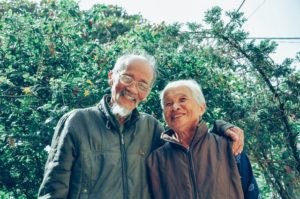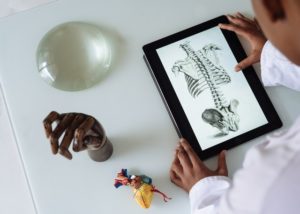 It was my first week in clinical posting when I encountered an old Chinese guy with late-stage colorectal cancer. I still remembered vividly how elated I was meeting real patients and clerking them since it was my first time entering the hospital as a medical student. This lovely gentleman was not my first patient that I examined but somehow he was one of the most memorable people that I have ever met in my life. He greeted me with a bright smile and welcomed me so warmly. Little did I know that he was actually living his final days. I did not entirely appreciate his kindness until I joined this workshop called ‘Silent Mentor’ in my second year of clinical posting. It has been almost a year and a half since the program ended. I have to admit that the experience was so life changing and gave an overwhelming impact on my professional development. It helped shape me into the person I am today and made me absolutely sure that I want to be a compassionate doctor one day.
It was my first week in clinical posting when I encountered an old Chinese guy with late-stage colorectal cancer. I still remembered vividly how elated I was meeting real patients and clerking them since it was my first time entering the hospital as a medical student. This lovely gentleman was not my first patient that I examined but somehow he was one of the most memorable people that I have ever met in my life. He greeted me with a bright smile and welcomed me so warmly. Little did I know that he was actually living his final days. I did not entirely appreciate his kindness until I joined this workshop called ‘Silent Mentor’ in my second year of clinical posting. It has been almost a year and a half since the program ended. I have to admit that the experience was so life changing and gave an overwhelming impact on my professional development. It helped shape me into the person I am today and made me absolutely sure that I want to be a compassionate doctor one day.
It is a program where people would donate their bodies for medical teaching and research after they die hence the name ‘silent’ mentor’. I believe that being a good doctor is not just limited to having vast medical knowledge but it goes way beyond that. It means practicing what we learned and cultivating correct attitude towards our patients. Throughout the one-week workshop, I was able to get a hands-on experience in performing basic surgical skills such as suturing, incising lumps, making Pfannenstiel incision and inserting chest tube on the cadaver, where I would just either observed or assisted during my attachment in the hospital. The wonderful thing about the program is that prior to the workshop, we would meet our mentor’s family members and get to know them as if they were still alive. We went through their old photos and videos, getting to know their hobbies and dreams and all their kind deeds as well as the achievementsthey had accomplished in life.
 My mentor was a kind-hearted lady, loved by many. She died of complications from late-stage colorectal cancer. It was intriguing how I could feel so attached to my silent mentor. I didn’t even know her, I’ve never met her personally or heard of her. How come a person can feel so much love from someone that she or he has never met before? Just from the way the family described her, I can really feel her love, kindness, generosity and sincerity. I felt really touched and inspired by her selfless contribution, more even when she donated her body, for me to learn on. During the closing ceremony, I kept remembering her face, of the times when I practiced on her and especially during the time I washed and cleaned her before coffining. Despite doing my best to prepare her for her final journey, I still felt I haven’t give my utmost respect. Perhaps I should be gentler or treated her better like she was a family member.
My mentor was a kind-hearted lady, loved by many. She died of complications from late-stage colorectal cancer. It was intriguing how I could feel so attached to my silent mentor. I didn’t even know her, I’ve never met her personally or heard of her. How come a person can feel so much love from someone that she or he has never met before? Just from the way the family described her, I can really feel her love, kindness, generosity and sincerity. I felt really touched and inspired by her selfless contribution, more even when she donated her body, for me to learn on. During the closing ceremony, I kept remembering her face, of the times when I practiced on her and especially during the time I washed and cleaned her before coffining. Despite doing my best to prepare her for her final journey, I still felt I haven’t give my utmost respect. Perhaps I should be gentler or treated her better like she was a family member.
I am reminded of a hadith where it stated, when a human die, his deeds come to an end except for three: ongoing charity, beneficial knowledge or a righteous child who prays for him.1 From this particular statement, we can say that my silent mentor and the other patients we see every day are actually doing an ongoing charity by giving us beneficial knowledge. They let us examined them even when they were unwell, without expecting anything in return so it’s only fair for us to treat them with much respect and dignity. There is another hadith where the Messenger of Allah, Muhammad (PBUH), has ordered us to plant trees even if the world comes to an end, “If the end of the world approaches and one of you has a seeds or plant in his hand, if he can plant it before the end comes, carry on and plant it.”2 It means that we have to always strive hard every day to become the best version of ourselves. We have to always try to contribute something in our life, no matter how small or big the contribution is.
 That was the moment when I realized the similarities between my silent mentor and the patient I met during my first week of clinical. They were both terminally ill but they were so affectionate and generous towards the people around them. Since then, I am a changed person. This experience has truly changed my perspectives towards patients, the living or dead. I have learnt a whole new sense of respect and compassion. It taught me to always be kind to our patients and try to understand them the best that I can. We must be humble and never patronize or treat them condescendingly. Keep in mind that they are in a very low point of their lives, hence we will never understand the pain and sufferings they patients are experiencing. So the least we could do as a student now is to treat them gently and provide a reassuring ear to listen.
That was the moment when I realized the similarities between my silent mentor and the patient I met during my first week of clinical. They were both terminally ill but they were so affectionate and generous towards the people around them. Since then, I am a changed person. This experience has truly changed my perspectives towards patients, the living or dead. I have learnt a whole new sense of respect and compassion. It taught me to always be kind to our patients and try to understand them the best that I can. We must be humble and never patronize or treat them condescendingly. Keep in mind that they are in a very low point of their lives, hence we will never understand the pain and sufferings they patients are experiencing. So the least we could do as a student now is to treat them gently and provide a reassuring ear to listen.
The journey in becoming a doctor is a long and character-defining one. With these events in mind, I really hope to become a more compassionate doctor and a better communicator in the future. “People will forget what you said, people will forget what you did, but people will never forget how you made them feel.” – Maya Angelou.
Dr Wan Ira Izyan recently graduated from Universiti Sains Islam Malaysia and is currently waiting her housemanship placement.
References:
- Hadith sahih authenticated by Muslim
- Hadith sahih authenticated by Al-Albani
[This article belongs to The Malaysian Medical Gazette. Any republication (online or offline) without written permission from The Malaysian Medical Gazette is prohibited.]
